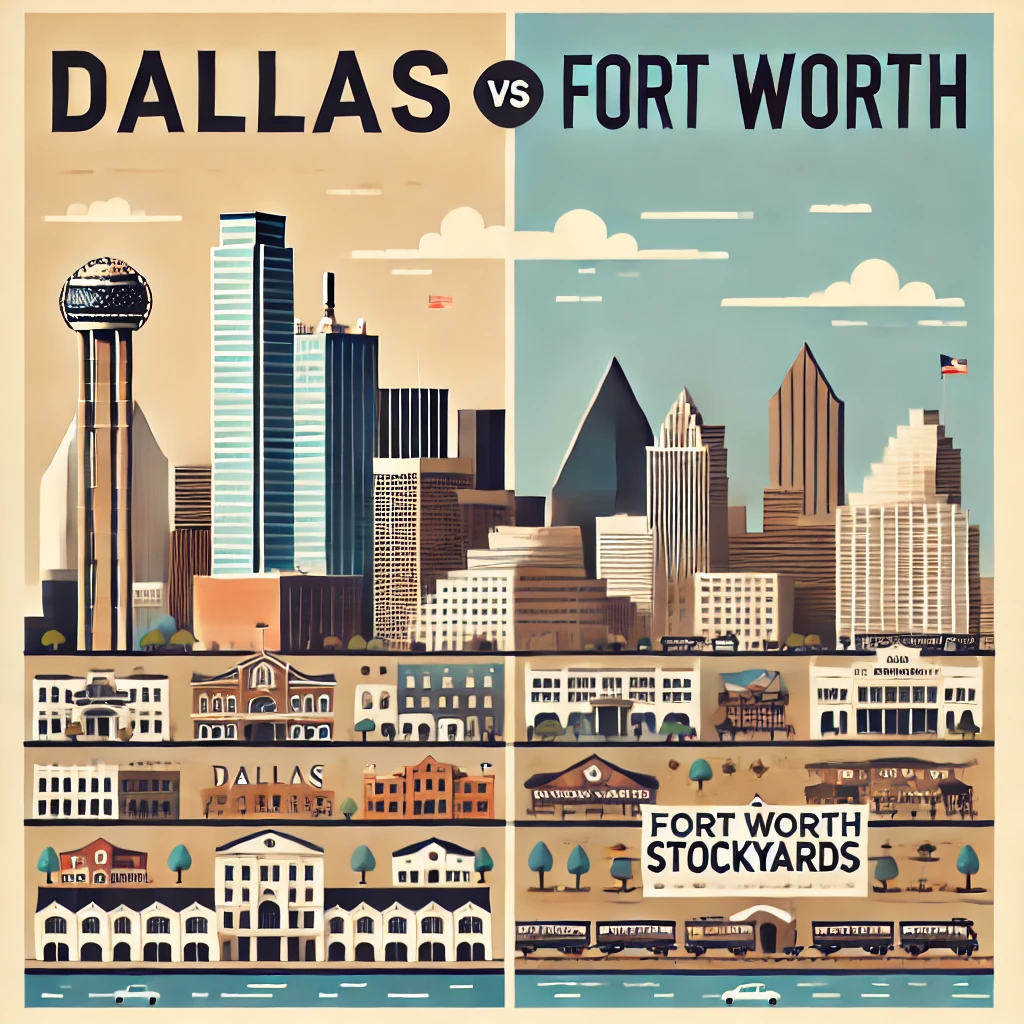Dallas vs. Fort Worth: A Comprehensive Comparison for Prospective Residents

When considering a move to North Texas, two cities often come to mind: Dallas and Fort Worth. While they are geographically close—only about 32 miles apart—they offer distinct lifestyles, cultures, and opportunities. This blog post aims to provide a detailed comparison of Dallas and Fort Worth across various aspects that matter most to prospective residents.
Location and Geography
Dallas is situated in the northeastern part of Texas and is a central hub within the sprawling Dallas-Fort Worth Metroplex. The city is characterized by its urban skyline, modern architecture, and a more fast-paced environment.
Fort Worth, on the other hand, lies to the west of Dallas and exudes a more relaxed, small-town feel despite its substantial size. Known as “Cowtown,” Fort Worth embraces its Western heritage, featuring historic districts and a more laid-back atmosphere.
Population and Demographics
- Dallas: With a population of approximately 1.3 million people, Dallas is the third-largest city in Texas. It boasts a diverse demographic mix, with a significant representation of various ethnic and cultural groups.
- Fort Worth: Fort Worth has a population of around 950,000, making it the fifth-largest city in the state. While also diverse, Fort Worth tends to have a slightly more homogeneous population, with a strong emphasis on its Texan roots.
Economy and Job Opportunities
Dallas is a major economic center, hosting numerous Fortune 500 companies in industries like technology, finance, and healthcare. The city offers abundant job opportunities, especially in sectors such as telecommunications, information technology, and banking.
Fort Worth has a robust economy anchored by industries like aerospace, manufacturing, and logistics. Companies like Lockheed Martin and American Airlines have a significant presence here. While the job market is strong, it is somewhat more specialized compared to Dallas.
Cost of Living
- Housing:
- Dallas: The median home price is around $270,000, with rental rates averaging $1,200 for a one-bedroom apartment.
- Fort Worth: Slightly more affordable, the median home price is about $240,000, and rentals average around $1,100 for a one-bedroom apartment.
- Overall Expenses: Both cities are relatively affordable compared to other major U.S. cities, but Fort Worth generally has a lower cost of living, especially in housing and utilities.
Culture and Entertainment
Dallas offers a vibrant arts scene, upscale shopping districts like the Galleria and NorthPark Center, and a plethora of fine dining options. The city is home to several professional sports teams, including the Dallas Mavericks (NBA) and the Dallas Cowboys (NFL).
Fort Worth is rich in cultural heritage, featuring the Fort Worth Stockyards, where you can experience daily cattle drives and rodeos. The city also hosts world-class museums like the Kimbell Art Museum and has a strong music scene, particularly in country and jazz genres.
Education
- Dallas: The city boasts several higher education institutions, including Southern Methodist University and the University of Texas at Dallas. The Dallas Independent School District offers numerous magnet and charter schools.
- Fort Worth: Home to Texas Christian University and Texas Wesleyan University, Fort Worth provides quality educational opportunities. The Fort Worth Independent School District is known for its specialized programs and community involvement.
Transportation
Dallas has a more extensive public transportation system, including the DART (Dallas Area Rapid Transit) rail and bus services, making it easier to navigate without a car.
Fort Worth offers the Trinity Metro services, including buses and the TEXRail commuter train, but public transportation is less comprehensive than in Dallas. Both cities are connected via the Trinity Railway Express (TRE), facilitating easy commuting between them.
Housing
Dallas offers a mix of urban apartments, historic homes, and suburban neighborhoods. Areas like Uptown and Deep Ellum are popular for their nightlife and proximity to downtown.
Fort Worth provides more spacious housing options, often at more affordable prices. Neighborhoods like Arlington Heights and Fairmount offer historic charm, while newer developments provide modern amenities.
Safety and Crime Rates
Both cities face typical urban challenges, but statistics generally show that Fort Worth has slightly lower crime rates compared to Dallas. As always, safety can vary widely between different neighborhoods within each city.
Conclusion
Choosing between Dallas and Fort Worth ultimately depends on your lifestyle preferences and priorities.
- Choose Dallas if you prefer:
- A bustling urban environment with a fast pace
- A diverse economy with broad job opportunities
- Extensive public transportation options
- A wide array of cultural and entertainment activities
- Choose Fort Worth if you prefer:
- A relaxed atmosphere with a small-town feel
- A strong sense of community and Texan heritage
- Slightly lower cost of living
- Specialization in industries like aerospace and manufacturing
Both cities offer a high quality of life, abundant opportunities, and a friendly Texan welcome. Consider visiting each to get a personal feel before making your decision.
Note: All statistics are based on data available up to October 2023 and may have changed since then.

